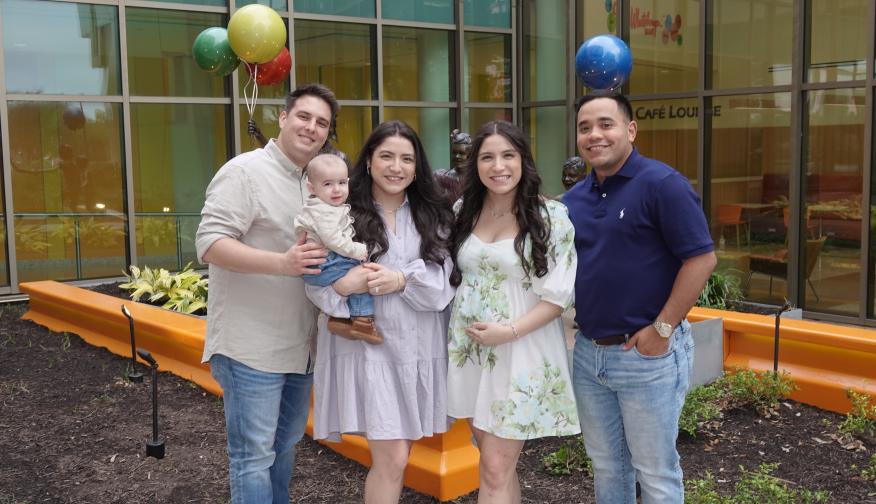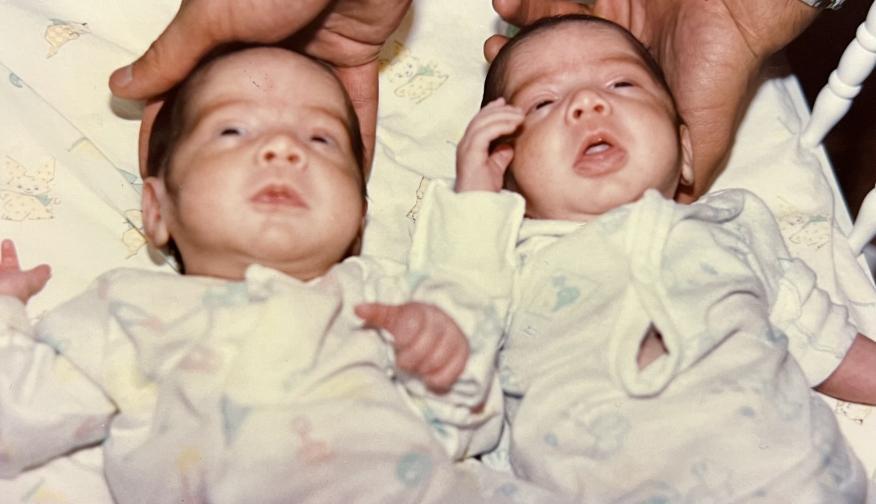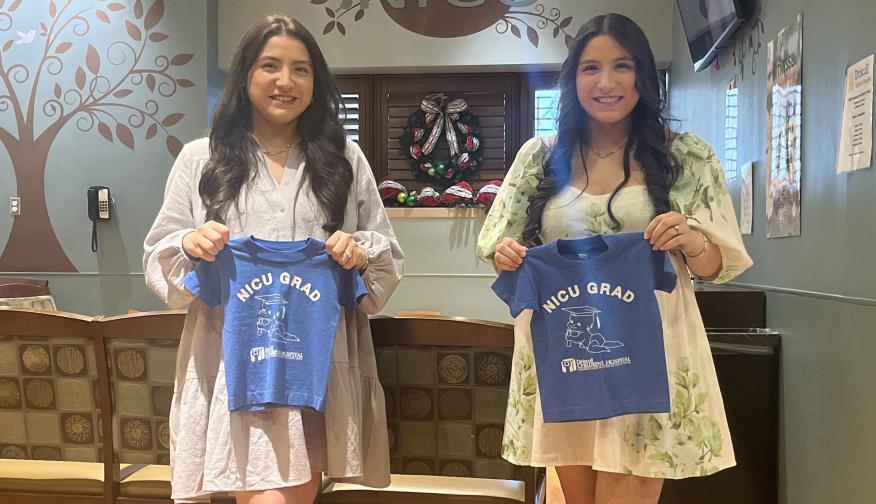
Twin nurses care for the tiniest patients in the same hospital where they once fought for their lives
When your newborn is admitted to the Neonatal Intensive Care Unit (NICU), one of the hardest parts to endure is the waiting. There’s endless waiting for vitals to reach critical numbers. Waiting with bated breath to see if your baby breathes after the intubation tube is removed. Waiting for your baby to develop muscles to swallow and breathe all at the same time.
Those days, weeks or even months in the hospital can feel agonizingly slow. Throughout this challenging time, families depend on Driscoll staff to provide excellent medical care as well as hope. There’s no one who embodies that hope more than registered nurses Alexa and Brianna Rabagos.
The Rabagos twins were delivered by c-section at 28 weeks in Corpus Christi. They were whisked away from their parents on an emergency transport to the Driscoll Children’s Hospital NICU. There they spent a month intubated until their lungs seemed strong enough to go home.
The twins made it home for Christmas only to have to return to Driscoll after New Year’s. They were admitted to the Pediatric Intensive Care Unit (PICU) with Respiratory Syncytial Virus (RSV), a common, contagious childhood respiratory ailment that affects some children more severely than others. Three months and many close calls later, they were finally allowed to return home.

Those first four months of the twins’ lives were just the beginning of their Driscoll story. The girls visited their pediatrician at the hospital and joined hospital family events. As they grew older, they decided that they too wanted to care for the hospital’s most vulnerable young patients. Together, they pursued a nursing degree and have recently joined Driscoll as registered nurses.
“We can honestly say that Driscoll saved our lives. If it wasn't for Driscoll, we wouldn't be here now as nurses for babies that are in the same situations as we were when we were born,” says Alexa.
Driscoll Chief Nursing Officer Julie Piña says she was amazed by the Rabagos sisters’ story when they showed up for a hiring event. Their connection to Driscoll went all the way back to the NICU. “For these two young ladies, they know what Driscoll did for them. And in a way it's like paying us back, even though that's what we're here for. It's a very unique story that they’re working in an environment that they needed when they were newborn babies.”
As nurses in the PICU, Alexa and Brianna spend their days caring for children, while offering strength and encouragement to their parents.
“When you get the moment of feeding a baby for the first time, carrying a child that was not able to be held yet, giving them a hug or just being that person to give them support, there's nothing like it. There’s no career more rewarding,” says Alexa.
Brianna adds, “We're able to be that beacon of hope for parents that are going through such a terrible, hard situation. But once you see a baby eating orally for the first time and we're the ones feeding them or see a child walk again after a surgery, it's truly a rewarding feeling to be those helpers in those most difficult situations for a family.”
Both twins admit that they know exactly what families experience. They grew up hearing the fear their parents faced as their first-born children had some close calls 27 years ago. “When they saw us getting CPR and intubated, they were sitting in the hallway in complete shock. They were crying. They didn't know what to do. It's scary for any parent. I can just remember them telling us of how hard and difficult it was to see us struggle and almost not make it,” says Alexa.
Today, for Brianna and Alexa’s co-workers, working alongside former patients is a daily reminder of the ultimate goal for all of their children. Piña says, “Stories like Brianna and Alexa make the work that we do real. It's the circle of life.”
Families who hear about the twins’ story can imagine a brighter future for their own children. “These young ladies were born and cared for in Corpus Christi. And now they're working in an industry that is so critical to our future. And so I think it gives hope to our future generations,” says Piña.

Like the Rabagos twins, many of the babies admitted to the NICU or PICU are born prematurely. The number of babies born prematurely is on the rise in the United States, according to the 2022 March of Dimes Report Card.
In Texas in 2021, the most recent year that data is available, one in nine babies (11.4 percent of live births) were born preterm.
Preterm birth is defined as a live birth before 37 completed weeks gestation. A premature newborn often needs to spend some time in the NICU until the baby’s lungs and oral/motor skills are more developed. That period usually is inversely related to the number of weeks away from gestational age the baby was born.
Most of those premature babies eventually go on to reach all the milestones of their full-term peers. But this unexpected start is distressing for parents.
Driscoll staff do everything they can to make this time easier for parents and their children.
Those families whose children require the extra support of a NICU or PICU can be confident that their children receive outstanding care in Driscoll’s state-of-the-art facilities.
That children receive the best pediatric care possible close to home is key to making the challenges of having a child in the hospital a little easier for families. Driscoll is designated a Level IV NICU from the Texas Department of State Health Services — the highest level of care for premature and critically-ill newborns.
The Driscoll NICU is staffed 24 hours a day, seven days a week by neonatologists, pediatric subspecialists and neonatal nurse practitioners. Board-certified intensive care physicians are on site at all times for both the NICU and PICU. Support staff of nurses, respiratory therapists, dietitians, surgeons, anesthesiologists, therapists and more are all specially trained to care for children – from the tiniest of babies through young adults. The range of services starts prior to birth and continues even after babies are discharged home.
Registered nurse Trey Stice, Director of the PICU at Driscoll Children's Hospital, is proud of what he and his staff have to offer.
“We provide extraordinary services ranging from intense cardiology services to endocrinology services and anything in between,” he said.
Every day when staff members come to work at Driscoll, their goal is to provide the kind of care they would want for their own children. For Alexa and Brianna, they’re also determined to provide the quality of care they received. Their hope is to give their patients the start they need to one day also pursue their dreams.
“What made us want to become nurses is the opportunities that it would give us to help families and children that need support at the scariest moment of their lives, just like people helped our parents,” says Alexa. “It was registered nurses and healthcare providers that helped them feel hopeful. That's the biggest thing that we wanted when we chose the profession of becoming registered nurses.”
For Alexa and Brianna’s parents, the twins say they can’t imagine a more perfect job for their daughters. “It was our dream to work here, but I know our parents are just in awe,” says Alexa. “They see the nurses that helped them in us, and I think that's the biggest impact that this hospital has on them and us.”
Stice considers the Rabagos nurses a reminder of the outcome he and his staff are trying to achieve at Driscoll. “What I hope that people get from the story about Brianna and Alexa is that you never should give up on your dreams just because of a complication in your life. Medical complications should never deter you from your dreams, and their success proves that.”

